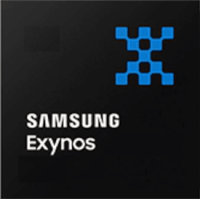
The processor Samsung Exynos 980 is developed on the 8 nm technology node and architecture Cortex-A77 / Cortex-A55. Its base clock speed is 2.20 GHz, and maximum clock speed in turbo boost - 1.80 GHz. Samsung Exynos 980 contains 8 processing cores. To make a right choice for computer upgrading, please get familiar with the detailed technical specifications and benchmark results. Check socket compatibility before choosing.
 CPU Cores and Base Frequency CPU Cores and Base Frequency |
||||
|---|---|---|---|---|
| Frequency | 2.20 GHz | Cores | 8 | |
| Turbo (1 Core) | 2.20 GHz | CPU Threads | 8 | |
| Turbo (All Cores) | 1.80 GHz | |||
| Hyperthreading ? | No | Overclocking ? | No | |
| Core architecture | hybrid (big.LITTLE) | |||
 Internal Graphics Internal Graphics |
|
|---|---|
| GPU name | ARM Mali-G76 MP5 |
| GPU frequency | 0.72 GHz |
| GPU (Turbo) | 0.72 GHz |
| Generation | |
| DirectX Version | 12 |
| Execution units | 5 |
| Shader | 80 |
| Max. Memory | 4 GB |
| Max. displays | 2 |
| Technology | 8 nm |
| Release date | Q3/2018 |
 Hardware codec support Hardware codec support
|
|
|---|---|
| H264 | Decode / Encode |
| H265 / HEVC (8 bit) | Decode / Encode |
| H265 / HEVC (10 bit) | Decode / Encode |
| VP8 | Decode / Encode |
| VP9 | Decode / Encode |
| AV1 | No |
| AV1 | No |
| AVC | Decode / Encode |
| JPEG | Decode / Encode |
 Memory & PCIe Memory & PCIe
| ||||
|---|---|---|---|---|
| Memory type | LPDDR4X-1866 | |||
| Max. Memory | 12 GB | |||
| Memory channels | 4 | ECC | No | |
| PCIe version | PCIe lanes | |||
 Thermal Management Thermal Management
| ||||
|---|---|---|---|---|
| TDP (PL1) | TDP (PL2) | |||
| TDP up | -- | TDP down | -- | |
| Tjunction max | -- | |||
 Technical details Technical details
| |
|---|---|
| Instruction set (ISA) | ARMv8-A64 (64 bit) |
| Architecture | Cortex-A77 / Cortex-A55 |
| L2-Cache | 2.00 MB |
| L3-Cache | -- |
| Technology | 8 nm |
| Virtualization | None |
| Release date | Q4/2019 |
| Socket | N/A |
The theoretical computing performance of the internal graphics unit of the processor with simple accuracy (32 bit) in GFLOPS. GFLOPS indicates how many billion floating point operations the iGPU can perform per second.
The AnTuTu 8 Benchmark measures the performance of a SoC. AnTuTu benchmarks the CPU, GPU, Memory as well as the UX (User Experience) by simulating browser and app usage. AnTuTu can benchmark any ARM CPU that runs under Android or iOS. Devices may not be directly compareable if the benchmark has been performed under different operating systems.